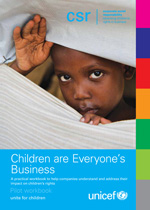Policy advocacy and partnerships for children's rights
UNICEF releases a workbook to help businesses respect and support children’s rights
By Bo Viktor Nylund and Ida Hyllested
GENEVA, Switzerland, 21 June 2012 –UNICEF has announced the release of a new pilot workbook that will help businesses protect and promote children’s rights.
Released on 12 June, ‘Children are Everyone’s Business: A practical workbook to help companies understand and address their impact on children’s rights’ helps companies better understand and address their impact on children.
It is currently being released as a pilot publication part of ongoing efforts to collect and integrate user input.
 |
| 'Children are Everyone’s Business: A practical workbook to help companies understand and address their impact on children’s rights' was released on 12 June. |
Corporate impact
Corporate actions to safeguard children’s rights must be undertaken in a holistic way, with companies addressing issues in the workplace, marketplace and the community. This is the key message accompanying the pilot workbook, which helps business take action to demonstrate their respect and support for children’s rights.
Each chapter provides guidance to companies on how to minimize or prevent harmful impacts on children and highlights methods to enhance their positive impacts in the workplace, marketplace and community.
The chapters also include short case studies and links to additional resources that offer deeper insight into areas of interest, depending on the company’s specific operations.
Global standards
The workbook builds upon the ‘Guiding Principles on Business and Human Rights’, which established global standards for business practices to ensure companies fulfil their duty to respect human rights. It is also aligned with ‘Children’s Rights and Business Principles’, which was released in March by UNICEF, the UN Global Compact, and Save the Children.
The workbook fills a significant gap in the existing literature on the impact of businesses on children’s rights.
UNICEF welcomes recommendations and feedback from users and invites companies to share case studies demonstrating their commitment to both their businesses and children’s rights.
Substantive changes
With the workbook in hand, companies will have a practical framework for understanding and assessing their footprint on children’s rights and will have access to recommendations for making substantive changes in their behaviour as it relates to children.
With this release, UNICEF encourages companies and relevant stakeholders, including civil society and governments, to use the workbook to deliver real and lasting change on behalf of children around the world.
Related links
In London, celebrating the global release of 'Children's Rights and Business Principles'
UNICEF co-hosts consultations on first-ever global standards for child-friendly businesses
The complete workbook can be downloaded at www.unicef.org/csr
For more information on the workbook, please contact csr@unicef.org

